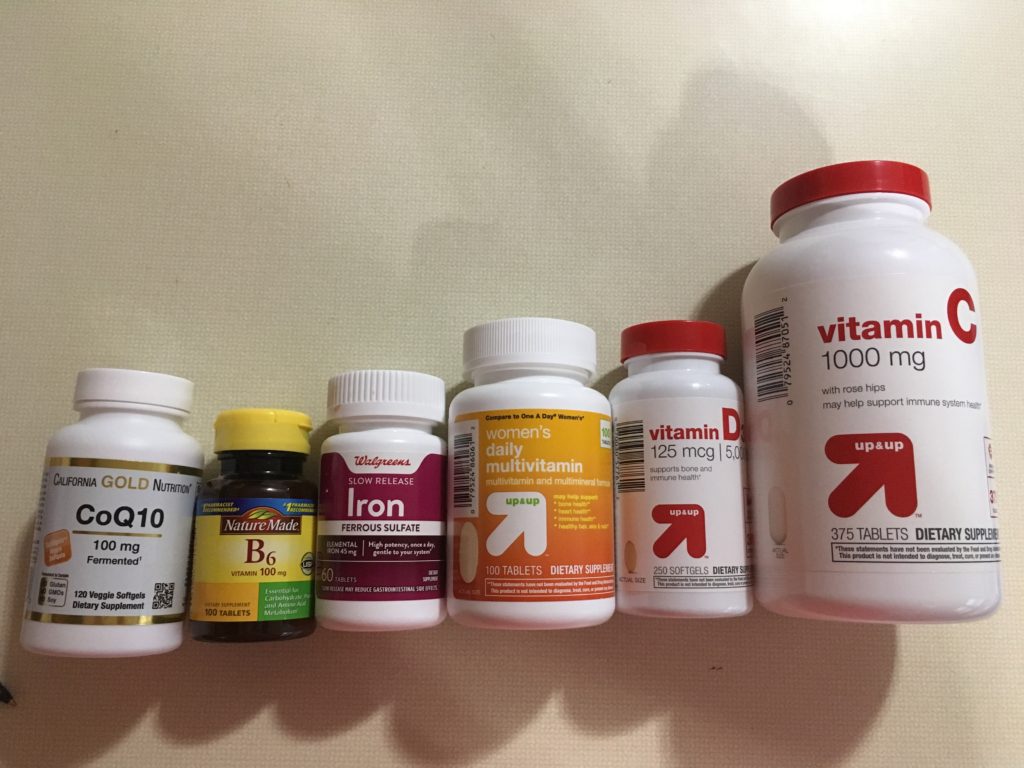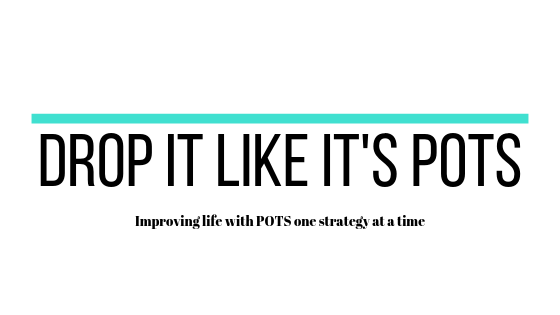Some vitamins, supplements, etc. have been useful to me or have enough scientific evidence to prove their worth in my treatment plan. I will discuss a few that I have tried in this post. This is not an exhaustive list as I will discuss some other things that I have tried or currently take in separate posts. To see a list of everything I am currently taking visit the current treatments page.
What I currently take
Vitamin B6
I take one tablet of vitamin B6 per day at the recommendation of the Mayo Clinic. They explained to me that vitamin B6 decreases the amount of inflammatory cytokines that are found in excess in the brains of people with ME. I started taking this when I started several other treatments, so I wouldn’t know if it does anything. However, I know I have no negative effects, so I continue to follow Mayo’s recommendation.
Iron
I have been taking iron for years because I am prone to being anemic. This helps me stay at a healthy level of iron. I take generic slow-release iron tablets. They have worked well for me and not caused any GI issues.
CoenzymeQ10
My nutritionist recommended that I take this. It is an antioxidant and is used by the mitochondria to produce ATP (energy for your cells). People with ME have been shown to have a deficiency of CoenzymeQ10 and it is thought that this deficiency contributes to the fatigue, autonomic symptoms (think POTS), and neurocognitive symptoms of people with ME. I have not noticed any benefit since starting this. However, the science makes sense to me and I have no negative effects, so I will continue to take it. I think this, Vitamin C, and Vitamin B6 are all about playing the long-game. I may not see a short-term impact, but perhaps they will be helpful in the long-term.
Multivitamin
Why not, right?
Vitamin C
The Mayo Clinic recommended that I take vitamin C because it (like vitamin B6) decreases the amount of inflammatory cytokines in the brain. I do not notice any benefits of taking this, but it doesn’t hurt so I continue to take a small amount daily.
Vitamin D
I was slightly low on this at one of my initial blood tests, so I take vitamin D each day. I just take the super cheap Up and Up tablets from Target. It boosted my levels by quite a bit when the blood work was repeated.

What I no longer take
Licorice Root
My neurologist recommended that I take this as a natural alternative to Florinef. Licorice root increases blood pressure and therefore may alleviate some symptoms for certain POTS patients. I tried it out for a month at two different dosages, and it didn’t do anything. I even did some comparison blood pressure measurements; it really did not do anything. I no longer take it because it didn’t work for me and I see this as less inert than say for example, vitamin C. There are clear warnings on the label to not take it for high dosage long-term use. I used to drink a licorice root tea that said not to consume it for longer than a month. So, I won’t take my chances.
Probiotics
I have taken them on and off for years, but I do not currently take any probiotics. I wasn’t sure about the efficacy of them, so I asked my nutritionist. She said, they can help, but eating fermented foods is better (and cheaper). She said all it takes is a forkful of sauerkraut a day. I do not eat any fermented foods because I think they are nasty, but I eat in a way that promotes good gut health. The nutritionist also said that probiotics can worsen SIBO (small intestine bacteria overgrowth), which is a common problem for POTS patients. Probiotics do not seem to be worth the cost for me as I have never seen any benefit while taking them.
Allergy medications
I mostly outgrew seasonal allergies, but had to go back to taking allergy medicine again this year. I have tried Xyzal, Zyrtec, Flonase (over the counter and prescription), Allegra, and Claritin. Allegra and Claritin work the best for me, but they still only half-treat my allergies. No matter what I do I constantly swallow 103948230984 pounds of mucous a day. Post nasal drip for life.
Speaking of post nasal drip for life…when I was a kid I used to gag all the time from it. I figured out that mints helped me not gag. I was a super weird kid, so I would fill up a mini White Sox fanny pack full of mints so I could have them at my disposal.

I am trialing a new POTS medication called Mestinon right now and my doctor suggested going off the allergy medicine to minimize the chance of a drug interaction. She said that since the allergy medicine isn’t super helpful for me anyway, I might as well go without to give the new POTS medication a better chance. That makes sense to me so I’m currently going without any allergy medication.
What vitamins/supplements/OTC medications do you take and how have they impacted you?
Disclaimer: I am not a medical professional. Statements on this site are not meant to be taken as medical advice. These statements reflect my personal experiences having mild-ish post-viral POTS and ME. Due to the wide spectrum of these diseases, comorbidities, and everyone being different, your experiences may be very different than mine.
Note: If you post a comment, this site does NOT have a feature to notify you of responses to your comment. I have not found a good solution for that yet. However, I usually respond to every comment in a timely manner, so be sure to check back.

5 Comments
n-acetyl cysteine, I mean
Thanks for a great blog! I find that avoiding too much dairy and supplementing with N-A ethyl Cysteine helps with snot-nose 🙂
Thanks Laura! Cool, I’ll have to check out the n-acetyl cysteine :).
I understand about the Post Nasal Drip. Nothing ever goes out the nose for me(except in extreme colds or crying). Trips to the dentist can be such a trial. I ink I’ve tried all the OTC that you’ve mentioned. They’re all equal to me, meaning they work initially & then they’re slackers. *sigh*
I haven’t heard anything about Vitamin C reducing histamine production. That may be true though, I just don’t know anything about it. I take 1000mg of Vitamin C a day and I don’t notice any allergy benefits from it but perhaps higher doses are more effective.